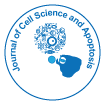Melatonin Protection against Ionizing Radiation in Space
*Corresponding Author: Mu-Tai Liu, Department of Radiation Oncology, Changhua Christian Hospital, Changhua 500, Taiwan, Tel: +886-4-7238595, Fax: +886-4-7232942, Email: tomgiessen@gmail.comReceived Date: Mar 15, 2019 / Accepted Date: Mar 29, 2019 / Published Date: Apr 08, 2019
Citation: Liu MT, Reiter RJ (2019) Melatonin Protection against Ionizing Radiation in Space. J Cell Sci Apo 2:112.
Copyright: © 2019 Liu MT, et al. This is an open-access article distributed under the terms of the Creative Commons Attribution License, which permits unrestricted use, distribution, and reproduction in any medium, provided the original author and source are credited.
Abstract
Aim: During space travel, astronauts are exposed to high-LET galactic cosmic rays at higher doses than humans experience on Earth. This is one of the recognized obstacles for long-duration, manned interplanetary missions. Estimation of the track structure of high-LET particles indicates that these particles could give rise to detrimental biological damage at the cellular level. Melatonin mitigates oxidative damage induced by ionizing radiation. Only a small number of investigations have been reported on melatonin-mediated protection against high-LET irradiation. A comprehensive understanding of the mechanisms and molecular pathways associated with protection against high-LET irradiation is essential in developing novel countermeasures for interplanetary travel by crewed spacecraft.
A systematic review of the existing literature was conducted using the following search terms: ‘melatonin’, ‘space radiation’, ‘charged particle irradiation’, ‘free radicals’, ‘oxidative stress’ and ‘antioxidant’. The search used PubMed and spanned the period from January 2000 to December 2018.
The collected data included ‘Melatonin mitigates oxidative damage and apoptosis in mouse cerebellum induced by high-LET 56Fe particle irradiation’, ‘Exogenous melatonin modulates apoptosis in the mouse brain induced by high-LET carbon ion irradiation’, ‘Protective effects of melatonin against high-LET radiation’, ‘Melatonin protects human cells from clustered DNA damages, killing and acquisition of soft agar growth induced by 970 MeV/n Fe ions’, ‘Space radiation-induced inhibition of neurogenesis in the hippocampal dentate gyrus and memory impairment in mice: ameliorative potential of the melatonin metabolite, AFMK’, ‘Melatonin modulates acute testicular damage induced by carbon ion irradiation in mice’ and ‘Ameliorating mitochondrial dysfunction restores carbon ion-induced cognitive deficits through co-activation of NRF2 and PINK1 signaling pathway’.
Conclusion: Pre-treatment with melatonin successfully inhibited the oxidative damage induced by high energy charged particle irradiation. The above-mentioned results provide a prospective application for protective strategies with respect to the space radiation hazards. Further investigation to elucidate the seriousness and outcomes of organ damage associated with space radiation is warranted.
